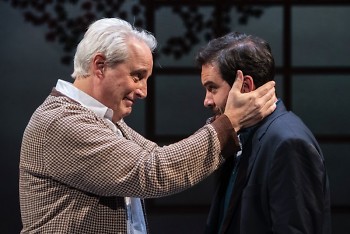Twenty-five years ago, Tuesdays With Morrie was published. Its author, Mitch Albom, had written it to pay for a dying friend’s medical bills. Beyond that, he had modest hopes. He would later joke that he envisioned himself selling copies out of the back of his car.
But the initial print run of 20,000 copies sold out. The book was reprinted, and reprinted again. It sold and has continued to sell. 14 million copies purchased means something about it clearly resonated. That something has been distilled into the theatrical version -- cowritten by Jeffery Hatcher and currently touring Michigan, including onstage at Wealthy Street Theatre.
It’s simplicity itself: two actors, one room. Cody Nickell plays Albom, first seen as a college graduate saying goodbye to Morrie Schwartz (Michael Russotto), his favorite professor. Albom promises to stay in touch and seems to mean it, but life is calling…
The rest can be quickly summarized because you probably know it already (14 million copies! Forty languages!). Albom, having achieved success as a sports journalist, turns on the TV one night only to see his former professor. Schwartz has been diagnosed with ALS. He’s dying. Albom, who hasn’t spoken to him in sixteen years, calls, then visits, then finds himself visiting every Tuesday.
We get to see Schwartz as Albom saw him: a secular saint, focused on others when he has all the reason in the world to be focused on himself. He’s dying and the play doesn’t spare the audience the sad reality of that. However, he’s also living -- listening to Puccini and dispensing wisdom laced with jokes.
It’s often said (not least by me) that an actor has embraced a role. It doesn’t tell you much. After all, embraces can be cold. But Russotto gives the role of Morrie Schwartz a big, strong bear hug. The joy radiating off him could have powered the theater itself.
That refusal to wallow in his own pain makes it more poignant for us to witness. As he was positioned in his chair, in order to let him look out the window, I remembered my father doing the same. That was neither the first nor the last time that Morrie Schwartz made me cry.
Nickell, as Albom, is at times just as present as Russotto. He nails Albom the world-beater, and he’s convincing as he mourns his professor and friend. Where he succeeds less is in letting us see his character’s insecurities. At times, as Schwartz twinkles, Albom looks away, aping bashfulness, but it never quite works.
Watching the play, I wondered the same thing I had when I first read the book: what’s causing this man to take a weekly flight? To skip Wimbledon? To put his career, at least to some degree, at risk? Schwartz gives us everything. Albom is cagier.
This isn’t to say that the play isn't successful. By asking the largest of questions (What are we to do with the time we have?), it forces audience members to ask it of themselves. I would not be at all surprised if someone left the theater only to find himself heading to the confessional, or at least making an overdue phone call.
The Rapidian, a program of the 501(c)3 nonprofit Community Media Center, relies on the community’s support to help cover the cost of training reporters and publishing content.
We need your help.
If each of our readers and content creators who values this community platform help support its creation and maintenance, The Rapidian can continue to educate and facilitate a conversation around issues for years to come.
Please support The Rapidian and make a contribution today.
